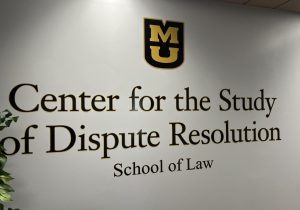Published on

Mizzou Law and the MU Center for Study of Dispute Resolution (CSDR) have a history of setting precedent. With that history, and some fortuitous timing, the center at Mizzou Law launched the first fully online, asynchronous LLM program in dispute resolution just before the pandemic began in 2020.
The program was intended to make the LLM accessible to those who could not afford or were not able to come to Columbia for the residential program.
Just four years later, Mizzou Law is now offering that same trailblazing asynchronous LLM program in dispute resolution taught entirely in Spanish.
“We identified two barriers,” professor Rafael Gely, one of the faculty members responsible for creating and teaching the program, said. “One was the language barrier: students wanted to do the LLM but didn’t feel comfortable doing it in English. The other was the costs associated with coming here for a year.”
After identifying a market for such a program, faculty in the CSDR, started the English LLM program and began conversations with universities in South America, hoping to recruit prospective students with an interest in alternative dispute resolution.
“We had an alumnus from Venezuela who was teaching at a graduate program in dispute resolution in Venezuela at Universidad Monteávila,” Gely said. “We started a conversation with them, and that eventually led to an agreement.”
Through the partnership with Universidad Monteávila, students enrolled in the university’s Advanced Studies in Arbitration Program may also complete their LLM in dispute resolution by taking an additional 15 hours of synchronous and asynchronous classwork.
Mizzou Law has also partnered with Universidad Minuto De Dios in Colombia, where students enrolled in the Master of Public Administration program can also complete their LLM in just 15 additional credit hours.
Unlike a traditional law degree, which may not translate across borders, the skills and concepts students learn in an LLM in dispute resolution are the same anywhere.
“It involves some discussion of law, but the principles are more general,” said Gely. “These are things like: how do you negotiate? How do you deal with conflict?”
In the past, LLM in dispute resolution students come from a diverse range of backgrounds, including lawyers, teachers, social workers, and even members of the clergy. Gely feels that students from South America will also represent a variety of fields.
Though the program is currently limited to Venezuela and Colombia, Gely and the other LLM faculty hope to expand to other Spanish-speaking countries in the future.
Like the world’s first Center for the Study of Dispute Resolution, which was founded at Mizzou nearly 40 years ago, and the original asynchronous LLM in dispute resolution, this program is just one more way in which Mizzou Law is creating innovative, accessible programming.